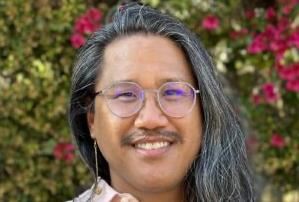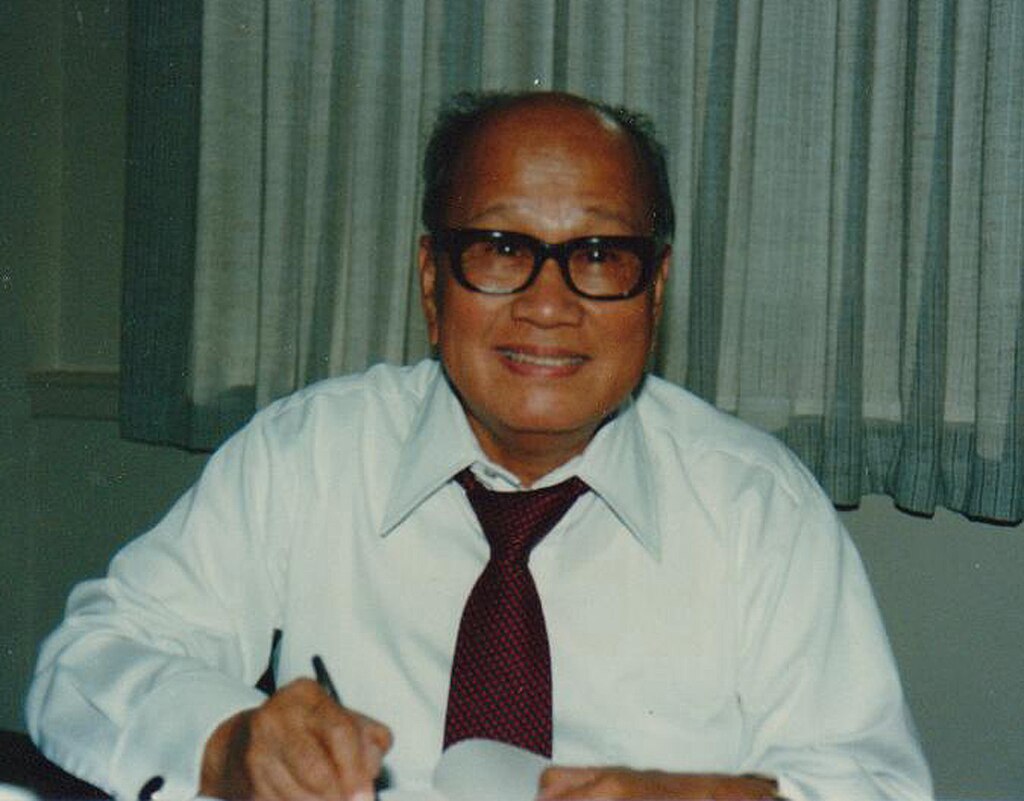

Big Idea: A Filipino Writer in Wichita
February 10, 2025

Ben Santos
Bienvenido “Ben” Santos is a classic writer of Asian American literature. Born in the Philippines in 1911, he spent a considerable amount of his adult life teaching creative writing on Midwest college campuses. He published short stories, novels, and poetry; however, his only publication that remains in print in the United States is his collection of short stories, Scent of Apples (University of Washington Press).
I first read Scent of Apples over a decade ago. Comprised of sixteen stories, some of which are connected by a common narrator, the collection largely features the lives of Filipino men during World War II and the postwar period in the Midwest and on the East Coast. This geographic detail is significant because the middle of the country, especially, is not the first place people think of when conceptualizing the Asian American experience. Instead, most people think of the West Coast, given its connection to Asia via the Pacific Ocean. Indeed, canonical Asian American literatures, such as Carlos Bulosan’s America Is in the Heart: A Personal History (1946), John Okada’s No-No Boy (1957), and Maxine Hong Kingston’s The Woman Warrior: Memoirs of a Girlhood Among Ghosts (1976), tend to be set on the West Coast, which notably has a large Asian American population.
As a Midwest transplant from the West Coast, I was intrigued by Santos’s stories set beyond the West Coast. Themes of loneliness, longing, and loss pervade his stories. And I could not help but wonder how place, the setting of these stories, plays a role in shaping such feelings. Homesickness is a common theme in Asian immigrant literatures, but I speculate that the smaller communities of Filipinxs in places outside the West Coast, such as the outskirts of Kalamazoo, Michigan, in the story “Scent of Apples” or Chicago in the story “The Day the Dancers Came,” make homesickness even more palpable for Santos’s characters.
Learning more about Santos’s life, I began to recognize how impactful the Midwest and especially Kansas was on his life and literature. Of all the places in the Midwest he sojourned—from Champaign-Urbana to Iowa City to Wichita—he lived the longest in Wichita. From 1973 to 1982, he served as Distinguished Writer in Residence at Wichita State University, teaching fiction and poetry and working on several pieces of his own writing. During his tenure there, he published Scent of Apples in 1979. Although all of the stories had been previously published, mainly in the Philippines, Wichita State provided a grant to publish the collection in the United States. WSU also hosted a celebration of the publication, which Santos fondly reminisced in his memoir Memory’s Fictions: A Personal History (1993).
Santos donated his personal papers to Wichita State, making Kansas an important scholarly destination for those interested in analyzing his life and literature. The archive includes ten boxes worth of materials, from diaries dating back to 1941 (his first year in the United States pursuing a master’s in English at the University of Illinois Urbana-Champaign) to personal correspondences, story and poem drafts, novel notes, and newspaper and magazine clippings.
Santos’s diary entries from 1941 remark on the frigid winter temperatures following the bombing of Pearl Harbor and the Japanese occupation of the Philippines. Exiled from his homeland because of the war, the climate metaphorizes his feelings of loneliness and longing for his wife Beatriz and their three young daughters whose whereabouts he was uncertain of. After the war, he was able to return and reunite with his family.
During the 1950s and 1960s, Santos returned the United States, specifically Iowa City, as a writer and instructor at the Iowa Writers’ Workshop. In 1972, he and Beatriz had planned to return to the Philippines but were unable due to then-President Ferdinand Marcos’s declaration of martial law. Santos pivoted by applying to teaching positions across the United States and landed a job at Wichita State. He only expected to stay for a year or so but ended up staying almost a decade.
Santos and Beatriz humbly lived on campus at the Wheatshocker Apartments—a contrast from the affluent Filipinx families who likely immigrated after the Hart-Cellar Act of 1965 and who nevertheless welcomed the elderly couple into their homes and treated them like family. The small Filipinx Wichitan community helped make the Santoses’ exile more bearable.
In his memoir, Santos states, “my writing flourished” in Wichita. Perhaps an unlikely place for a Filipinx writer in exile, Wichita clearly is a significant place in Filipinx American history because of Santos’ time spent there. As a Filipinx American professor in Kansas State University’s English Department, I find comfort knowing that one of Philippine and Filipinx American literature’s notable writers also found a home in the Sunflower State.
Dr. Thomas X. Sarmiento is Associate Professor and Director of Undergraduate Studies in the Department of English at Kansas State University. They specialize in Filipinx American and queer literature and culture and are currently working on a book manuscript that examines representations of Filipinxs in the Midwest.
Spark a Conversation
- READ/LISTEN to Abby Bayani-Heitzman’s Literary Landscapes essay, “Bienvenido Santos, Ablah Library, Wichita, Kansas” from New Territory Magazine and High Plains Public Radio.
-
LISTEN to Dr. Tom Sarmiento’s 4-minute Humanities Hotline recording, “Bienvenido Santos.”
-
READ The Scent of Apples by Bienvenido Santos.



